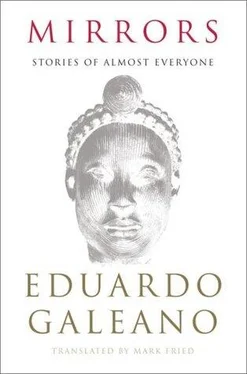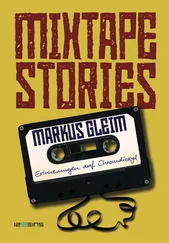Shakespeare gave him the words that made him immortal:
“My kingdom for a horse!”

More than a century after the pope in Rome divided half the world between Spain and Portugal, the English jurist John Selden published Mare clausum in 1635.
This treatise proved that not only the land had an owner, but the sea as well, and His Majesty the king of England was, by natural right, the legitimate proprietor of the lands and waters of his expanding empire.
Thus the foundation of British property law was laid on the god Neptune, on Noah and his three sons, on Genesis, Deuteronomy, and the Psalms, and on the prophecies of Isaiah and Ezekiel.
Three hundred and sixty years later, the United States claimed all rights over outer space and the celestial bodies, but they did not invoke such prestigious authorities.

Year after year, at the end of November, the United States celebrates Thanksgiving. The nation expresses its gratitude to God and to the Indians who helped God save the conquering Pilgrims.
The winter of 1620 had killed half the Europeans who arrived on the Mayflower . The following year God decided to save the survivors. The Indians gave them shelter, hunted and fished for them, taught them to grow corn, to avoid poisonous plants, to use medicinal plants, and to find nuts and cranberries and other wild fruits.
The saved then offered their saviors a Thanksgiving feast. It was held in the English village of Plymouth, which a short while before had been Patuxet, an Indian village devastated by smallpox, yellow fever, and other novelties brought from Europe.
That was the first and last Thanksgiving in colonial times.
When the colonists invaded Indian lands, the moment of truth arrived. The invaders, calling themselves “holy” and also “the chosen,” stopped calling the Indians “natives” and started calling them “savages.”
THIS EXECRABLE CREW OF BUTCHERS

At the beginning of the eighteenth century, Jonathan Swift portrayed the colonial adventure in the final chapter of Gulliver’s Travels :
A crew of pirates goes on shore to rob and plunder, they see a harmless people, are entertained with kindness; they give the country a new name; they take formal possession of it for their king; they set up a rotten plank, or a stone, for a memorial.
Here commences a new dominion, acquired with a title by divine right. Natives are driven out or destroyed; their princes tortured to discover their gold; a free license given to all acts of inhumanity and lust, the earth reeking with the blood of its inhabitants: and this execrable crew of butchers, employed in so pious an expedition, is a modern colony, sent to convert and civilize an idolatrous and barbarous people!

The first edition of Gulliver’s Travels was published under a different title and without the author’s name.
Perils obliged caution. The previous works of Jonathan Swift, a high-ranking priest, dean of Saint Patrick’s Cathedral in Ireland, had earned him several charges of sedition, and landed the publisher in jail.
The runaway success of Gulliver allowed Swift to sign his name to later editions. He also signed his new book. A Modest Proposal: For Preventing the Children of Poor People in Ireland from Being a Burden to Their Parents or Country, and for Making Them Beneficial to the Publick was the extraordinarily long title of the fiercest political pamphlet ever written.
In the icy language of economic science, the author laid out the objective advantages of sending the children of the poor to the slaughterhouse. These children could become “at a year old a most delicious, nourishing and wholesome food, whether stewed, roasted, baked or boiled,” and what’s more their skins could be made into ladies’ gloves.
This was published in 1729, when even ghosts were wandering the streets of Dublin in search of food. It did not sit well.
Swift specialized in formulating insufferable questions:
Why did his plan to promote cannibalism provoke horror when the entire country of Ireland was being eaten alive by England and no one moved a finger?
Were the Irish dying of hunger because of the climate or because of colonial strangulation?
Why was he a free man when he was in England and a slave as soon as he set foot in Ireland?
Why didn’t the Irish refuse to buy English clothing and English furniture, and learn to love their country?
Why didn’t they burn everything that came from England, save the people?
He was declared insane.
His savings had financed Dublin’s first public insane asylum, but he was not sent there. He died before it was finished.
CELESTIAL AND TERRESTRIAL

England, eighteenth century: everything was on the rise.
Smoke rose from factory chimneys,
smoke rose from victorious cannons,
waves rose from the seven seas ruled by the hundred thousand sailors of the king of England,
profits rose on all the goods England sold,
and earnings rose on all the money England loaned.
Every Englishman, no matter how uninformed, knew that the world and the sun and the stars revolved around London.
But William Hogarth, the greatest English artist of the century, was not distracted by the splendors of London at the summit of the universe. He was more attracted by lows than highs. In his paintings and etchings, everything was falling down. Across the floor rolled drunks and bottles,
broken masks,
broken swords,
broken contracts,
wigs,
corsets,
ladies’ undergarments,
gentlemen’s honor,
votes bought by politicians,
titles of nobility bought by the nouveaux riches,
cards that told of fortunes lost,
letters that told of loves lost,
and the rubbish of the city.

Centuries have passed and the influence of English philosopher John Locke on universal thought continues to grow.
It is entirely appropriate. Thanks to Locke we know that God bestowed the world on its legitimate proprietors, “the industrious and rational.” It was Locke who laid the philosophical groundwork for human freedom in all its dimensions: free enterprise, free trade, free competition, free hiring and firing.
And the freedom to invest. While he was writing An Essay Concerning Human Understanding , the philosopher did his part for human understanding by investing his savings in Royal African Company stock.
That firm, owned by the British Crown and by “the industrious and rational,” hunted and captured slaves in Africa and sold them in America.
According to the Royal African Company, its efforts guaranteed “a constant and sufficient supply of Merchantable Negroes, at moderate rates.”

When the eighteenth century began, a Bourbon king sat on the throne in Madrid for the first time.
As soon as he donned the crown, Philip V became a slave trader.
Читать дальше



















